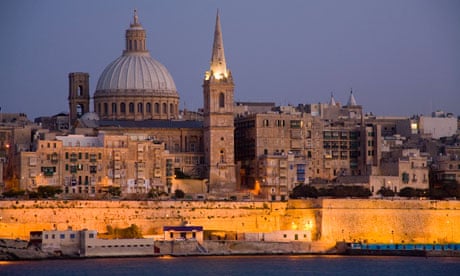Sharon Connor's story, featured on our front page today, is one of the most heart-rending we have ever covered. Not only did she lose her husband tragically early, she has now also lost much of her life savings amid the Cypriot banking collapse.
Once again it throws the spotlight on how secure our bank accounts really are. Last week I wrote that AgriBank, a new player in the British savings market, is offering temptingly high interest rates, but is authorised in Malta, and therefore dependent on the Maltese €100,000 deposit protection scheme.
With memories still fresh of the Iceland debacle, when Icesave's failure overwhelmed the country's deposit protection scheme, I felt it worth a warning, especially given the fact that Malta, like Cyprus, has a super-sized financial sector.
I was wrong. The truth is that deposits in AgriBank are not protected whatsoever. What has emerged is that there is an alarming loophole in EU compensation arrangements, and reason to be seriously concerned about the EU's so-called "single passport" for banking.
AgriBank, although it has no historic connections with Malta, has been granted a licence to operate as a bank by the Malta Financial Services Authority (MFSA) and, because Malta is in the EU, the bank is allowed to take deposits in any of the 26 other countries in the union.
This is one of the drawbacks to the EU's neo-liberal drive for single markets, but profound inability to produce single regulators. We have the farcical set-up of a single banking market, but 27 different regulators all able to offer authorisation for a bank to operate across the entire union. Given the dog's dinner that is RBS, maybe you think our regulators in London are no better than those in Bucharest or Bratislava, but I don't quite buy it. The catastrophic collapses in Reykavik (though outside the EU) and Nicosia tell you otherwise.
But even more bizarre is the loophole that has opened up in Malta. It turns out I was right to assume that banks registered in an EU state have to become members of that state's €100,000 protection scheme, as set out in the European Deposit Guarantee Scheme Directive.
But see if you can make head or tail of this. The MFSA emailed me to say: "We can confirm AgriBank is a member of the Malta Deposit Compensation Scheme (DCS)." Yet on AgriBank's website it says "AgriBank's deposit products are not covered by a depositor compensation scheme."
So is it or isn't it? The MFSA explains it, sort of, in this way. "Please note that on 16 May 2012, the MFSA had issued a policy under which it prohibited (or limited) any newly licensed credit institutions from creating undue liabilities on the local deposit compensation scheme … The position of AgriBank is therefore that while it is a member of the DCS, its funding shall be in the form which are [sic] not considered as eligible deposits under the DCS … There are currently ongoing discussions with AgriBank regarding amendments required to the text on their website."
As far as I can work out, this confirms that you can obtain a cross-EU banking licence from Malta, operate in the UK, be a member of a compensation scheme, but not really be a member of a compensation scheme. Yet one more tiny example of the mountain of idiocies that make so many people loathe the EU.
I don't want to suggest, of course, that Malta is anything other than a paragon of financial virtue, rather than a tax haven favoured by hedge funds. Indeed, when I asked the MFSA questions about AgriBank, its chairman, Professor Joe Bannister, replied in person. "All banks applying for a licence in Malta have to go through a rigorous procedure before being granted the licence," he said. Bannister is furious at any suggestion that Malta is next after Cyprus. "Such statements are ill-founded and have created unnecessary unease about Malta," he adds.
Yet the country's finance minister, Edward Scicluna, is chastened by what he witnessed at EU talks over Cyprus. Writing in the Malta Times he said God help his country if it encounters similar problems in the eurozone.

